




A dishwasher is a convenient appliance that helps to simplify our daily chores. However, it can be frustrating when it starts making unusual noises during its operation. Understanding the different sounds that your dishwasher can produce will allow you to identify and address any issues that may arise.
One of the most common reasons for a dishwasher to make noise is a poorly functioning motor. If the motor is disconnected or not operating properly, it can produce loud buzzing or buzzing sounds. This can be caused by a blocked or poorly aligned spray arm, which prevents water from reaching all areas of the dishwasher. Checking the spray arms for any blockages and ensuring they are properly aligned can resolve this issue.
Another potential cause of a noisy dishwasher is a malfunctioning recirculation pump. This pump is responsible for sending water through the dishwasher during its cycles. If the pump is noisy, it may be due to worn-out bearings or a stuck impeller. In some cases, forcing the impeller to move or replacing the bearings can resolve the issue.
If your dishwasher is making a loud noise during the fill cycle, a defective inlet valve may be to blame. The inlet valve is responsible for allowing water to enter the dishwasher. If it is not functioning properly, it can cause a squealing noise or can prevent water from entering the dishwasher. Checking the inlet valve and replacing it if necessary can resolve this issue.
Additionally, there are other causes of a noisy dishwasher that you should check for. These include a blocked chopper blade, a faulty intake valve, or loose particles stuck inside the dishwasher. Unscrewing the chopper blade and cleaning any particles inside the dishwasher can help resolve these issues. It is important to note that these troubleshooting steps are just a starting point and depending on the specific make and model of your dishwasher, there may be more-specific causes and solutions.
In conclusion, a noisy dishwasher is not only annoying but may also indicate a malfunctioning component. By understanding the different sounds your dishwasher can make and checking for common causes like a poorly functioning motor, a malfunctioning recirculation pump, or a faulty inlet valve, you can address the issue and restore your dishwasher to its normal, quiet operation.
Why is My Dishwasher Making a Noise?
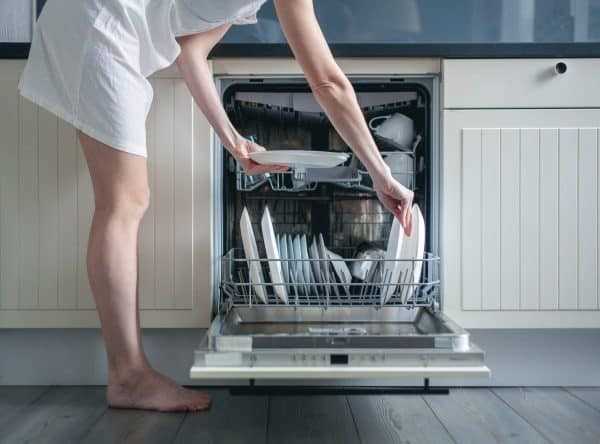
If you’ve noticed that your dishwasher is making unusual noises, it can be a cause for concern. Here are some possible reasons for a noisy dishwasher:
- Grinding Sounds: If your dishwasher is making grinding sounds, it could be due to a worn-out chopper blade or a broken circulation pump. In such cases, you may need to replace these components to resolve the issue.
- Loud Motor: A noisy motor can be caused by worn-out bearings. If you’ve heard a loud motor noise, replacing the motor might be necessary.
- Noisy Drain: If your dishwasher is making noise while draining, it could be due to a faulty drain pump or a clogged drain pipe. Check the pump and clean the pipe to ensure proper drainage.
- Water Inlet Valve: A noisy water inlet valve can cause high-pitched or vibrating sounds. If you suspect it’s the valve, you may need to replace it to eliminate the noise.
- Recirculation Pump: If the noise is coming from the recirculation pump, it could be due to a clog or worn-out bearings. Clean the pump and replace any faulty parts to resolve the issue.
- Worn Pump Seals: If the dishwasher’s pump seals are worn out, it can cause a loud noise during operation. Replacing these seals can help mitigate the noise.
- Inlet Pipe Noise: If the dishwasher is making noise when the water is flowing into the machine, it could be due to vibrations in the inlet pipe. Properly securing the pipe can help eliminate this noise.
- Loose or Worn Parts: Loose or worn parts such as crockery, dishwasher arms, or other internal components can cause rattling or clanging noises. Make sure all parts are properly secured or replace any damaged components.
Understanding the various components of your dishwasher and the potential causes of noise can help you troubleshoot and repair the issue correctly. If you haven’t dealt with a noisy dishwasher before, you’ll find that with some basic knowledge and the right tools, you can resolve most issues without having to call in a repair service.
Check for Loose Items
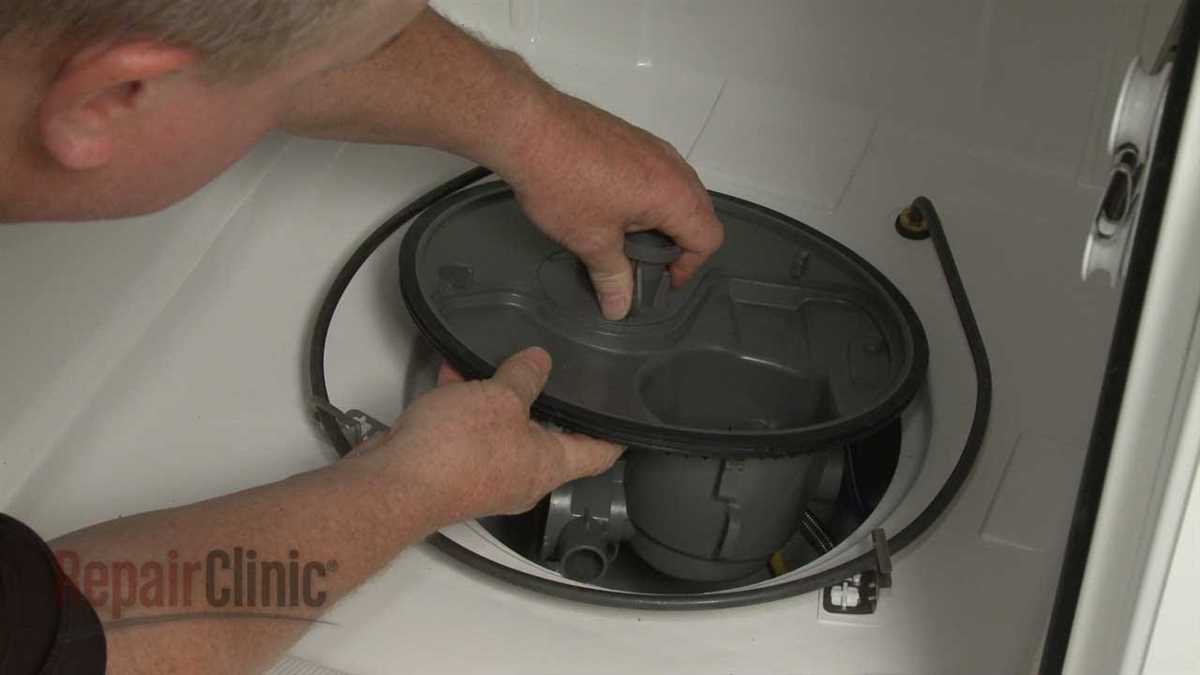
If your dishwasher is making a noise, one of the possible reasons could be loose items inside the machine. To determine if this is the cause, follow these steps:
- Turn off your dishwasher and unplug it from the power source.
- Open the dishwasher door and carefully inspect the interior for any loose items that may have fallen or shifted during the cleaning process. Common loose items include utensils, small dishes, or lids.
- Remove any loose items you find and place them in their appropriate location in the dishwasher.
- Once you have ensured that there are no loose items inside, close the dishwasher door and plug it back into the power source.
After performing these steps, run a test cycle to see if the noise has been resolved. If the noise continues, there may be other causes that require further troubleshooting or repair.
Inspect the Spray Arms
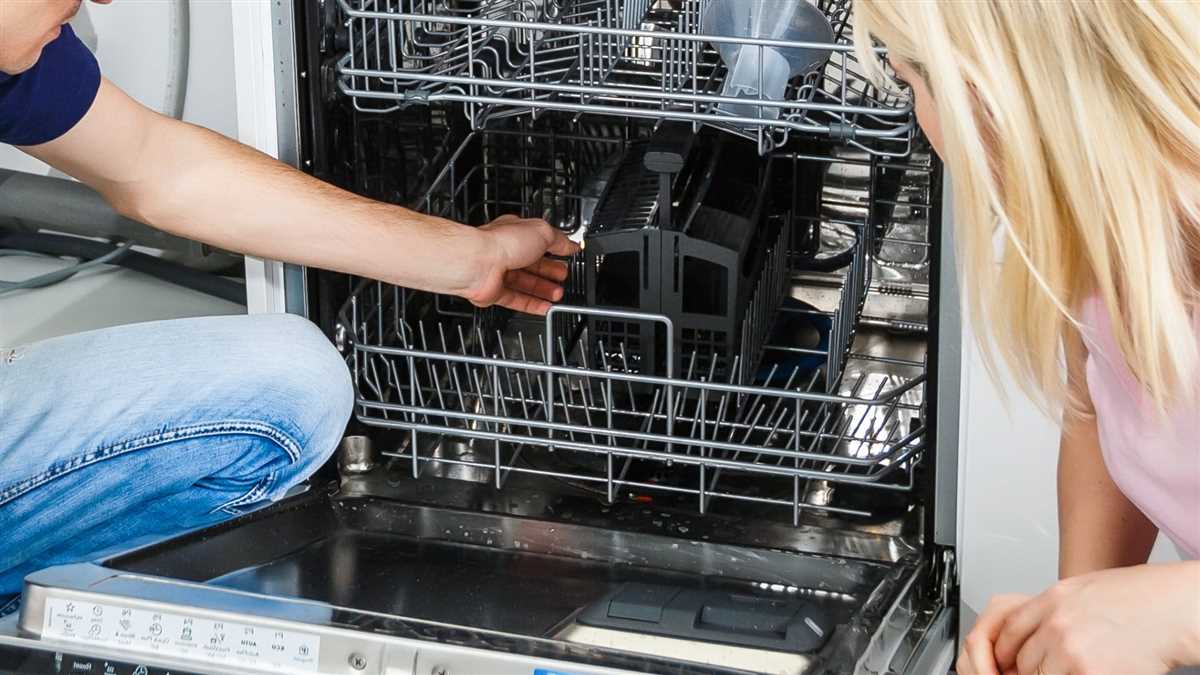
One of the reasons your dishwasher may be making a noise is due to issues with the spray arms. Spray arms are responsible for distributing water in the dishwasher during its operation. If they are malfunctioning or blocked, they can cause noisy operation.
To inspect the spray arms, follow these steps:
- Turn off the dishwasher and unplug it from the power source for safety.
- Open the dishwasher door and locate the spray arms. They are usually located at the bottom, top, or under the top rack of the dishwasher.
- Check for any visible damage on the spray arms, such as cracks or broken pieces. If you notice any issues, the spray arm may need to be replaced.
- Remove the spray arms from their holders, if possible, by gently pulling them upward. Be careful not to force them as they may break.
- Inspect the spray arms for any debris or particles that may be blocking the spray holes. Use a towel or a soft brush to clean the spray arms and remove any obstructions.
- Check the spray arm holes for blockages and clean them if necessary. Small particles can easily get trapped inside and affect the spray arm’s performance.
- Make sure the spray arms are properly aligned and can move freely without any restrictions. If they are stacked with crockery or other items, rearrange them to allow for proper rotation.
- Inspect the spray arm bearings and impeller for any signs of damage or wear. These components can cause squealing or noisy sounds if they are defective. If needed, contact a professional technician for repair or replacement.
Once you have inspected and cleaned the spray arms, reassemble them back into their holders and make sure they are securely in place. Close the dishwasher door and plug it back into the power source.
Now, run a test cycle to see if the noise problem has been resolved. If the dishwasher is still making unusual noises, there may be other factors or components causing the issue, such as the motor or inlet valve. In such cases, it is best to seek professional repair assistance.
Examine the Water Inlet Valve
If your dishwasher is making noise while running, one of the reasons could be a faulty or poorly functioning water inlet valve. The water inlet valve is responsible for regulating the flow of water into the dishwasher. If it is not working properly, it may cause noisy sounds.
To identify if the water inlet valve is the cause of the noise, you can perform the following checks:
- Check the water level: Make sure the water level in your dishwasher is proper. If the water level is too low, it can lead to noisy sounds.
- Inspect the water supply line: Ensure that the water supply line is not kinked or twisted, as this can restrict the flow of water into the dishwasher.
- Examine the solenoid valve: The solenoid valve is a part of the water inlet valve. If the solenoid valve is stuck or defective, it can cause buzzing or humming sounds.
- Check the impeller: The water inlet valve has an impeller that circulates the water inside the dishwasher. If the impeller is worn out or damaged, it can produce noisy sounds.
- Inspect the inlet valve bearings: Over time, the bearings of the water inlet valve may wear out, resulting in noise. Make sure to check them and replace if necessary.
- Examine the water recirculation pump: The water recirculation pump is responsible for circulating water during the wash cycle. If it is faulty or clogged, it can create noise. Remove any obstructions or clean the pump if needed.
If you’ve checked all these components and still haven’t identified the cause of the noise, it’s recommended to call a professional for dishwasher repair. They will have the necessary expertise to diagnose and fix the issue.
Remember to always prioritize safety when examining and repairing any dishwasher components. If you’re unsure or uncomfortable with the process, it’s best to seek professional assistance.
Check the Drain Pump
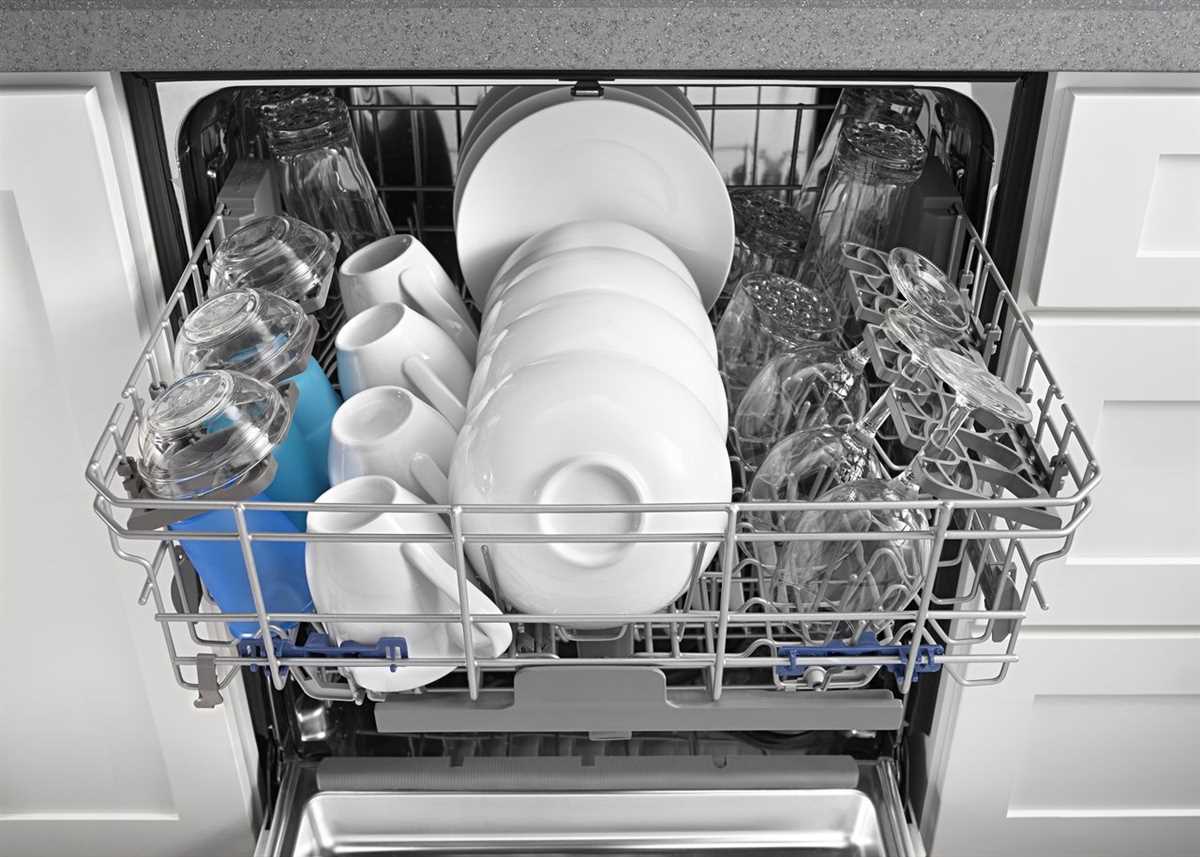
If your dishwasher is making a noise, one of the possible reasons could be a problem with the drain pump. The drain pump is responsible for removing water and particles from the dishwasher during the drainage cycle.
To check the drain pump, follow these steps:
- Turn off the power to the dishwasher to ensure safety.
- Unstack any dishes or utensils that may be blocking access to the pump area.
- Locate the drain pump, which is usually located at the bottom of the dishwasher.
- Depending on the model of your dishwasher, the drain pump may have one or more impellers that spin to force water out of the machine. Check if any of these impellers are damaged or blocked.
- If you notice any blockages or damage, remove them carefully. Use a pipe cleaner or a small brush to dislodge any debris that may be stuck in the pump.
- Inspect the drain line for any clogs. If you find any, remove them using a plunger or a plumber’s snake.
- Check the chopper blade, which keeps large particles from entering the pump. If the blade is worn out or damaged, it may need to be replaced.
- Inspect the seals and gaskets of the pump for any signs of wear or damage. If necessary, replace them to ensure proper operation.
Once you have checked and solved any issues with the drain pump, run a test cycle to see if the noise problem has been resolved. If the dishwasher is still making loud noises, you may need to consult a professional or contact the manufacturer’s service clinic for further assistance.
Call a Professional
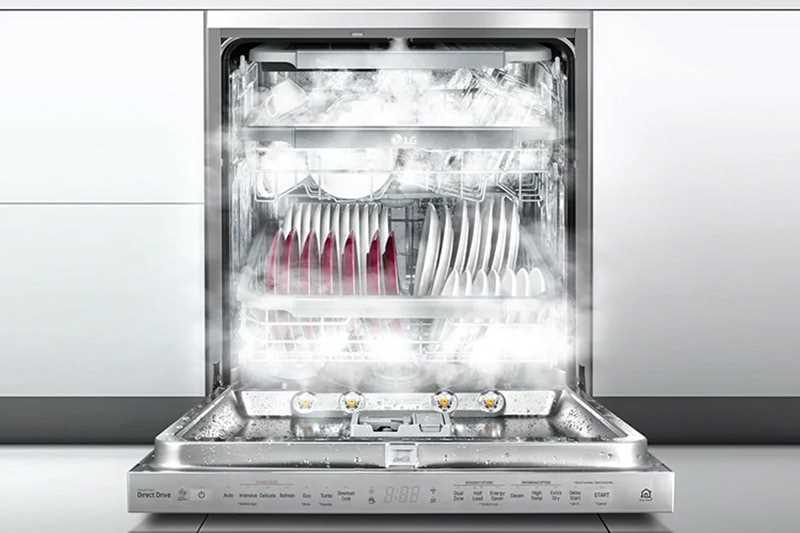
If you have followed the troubleshooting guide and your dishwasher is still making a loud noise, it may be time to call a professional. There could be several reasons why your dishwasher is noisy, and a professional technician will have the expertise to identify and solve the problem.
One possible reason for the noise could be a malfunctioning motor. Over time, the bearings in the motor may wear out, allowing more noise to be generated during operation. If the motor is defective, it may need to be replaced.
Another reason for a noisy dishwasher is a blocked or damaged impeller. The impeller is responsible for moving water around the dishwasher during the different cycles. If it becomes blocked or worn out, it can create a grinding sound. A professional technician can check and replace the impeller if necessary.
The spray arms in your dishwasher could also be a source of noise. If they are not properly aligned or if there is debris or particles stuck in the spray nozzles, they can create loud noises during operation. A professional can check and clean the spray arms to ensure they are functioning correctly.
Other components, such as the water inlet valve or the solenoid, could also be causing the noise. These parts may need to be checked and replaced if they are defective or not functioning properly.
Finally, if you haven’t done so already, it’s a good idea to check for safety reasons. Make sure the dishwasher is properly grounded and that there are no loose connections or wires that could be causing the noise.
In conclusion, if your dishwasher is making a loud noise and you have tried all the troubleshooting steps listed above, it’s best to call a professional. They will have the knowledge and expertise to identify and solve the problem, whether it’s a faulty motor, blocked impeller, or any other reason for the noise.
FAQ
Why is my dishwasher making a loud grinding noise?
If your dishwasher is making a loud grinding noise, it could be due to a malfunctioning motor or a faulty pump. This can happen if the motor bearings have worn out or if there is debris stuck in the pump assembly. It’s best to call a professional technician to diagnose and fix the problem.
What should I do if my dishwasher is making a rattling sound?
If your dishwasher is making a rattling sound, it could be due to loose or worn out parts. Check the spray arm, racks, and utensil holders to make sure they are securely in place. If they are loose or damaged, replace them. If the problem persists, it’s best to call a technician for further inspection.
Why is my dishwasher making a squeaking noise?
If your dishwasher is making a squeaking noise, it could be due to a worn out door seal or a faulty door hinge. Inspect the door seal for any signs of wear or damage and replace it if necessary. If the squeaking noise continues, check the door hinges for any issues and lubricate them if needed. If the problem persists, it’s best to call a professional.
What could be causing my dishwasher to make a humming noise?
If your dishwasher is making a humming noise, it could indicate a problem with the motor or the pump. Check if there is any debris stuck in the pump assembly and remove it if possible. If the humming noise continues, it’s best to call a technician to inspect and repair any potential motor or pump issues.
Why is my dishwasher making a clicking sound?
If your dishwasher is making a clicking sound, it could be due to a faulty solenoid or a valve. Inspect the solenoid and valve for any signs of damage or malfunction. If they are faulty, they may need to be replaced. It’s advisable to consult a professional technician for further diagnosis and repair.













